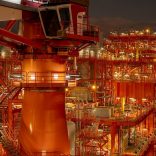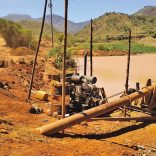Mozambique-Zimbabwe Pipeline Company to increase fuel transport capacity
From a gas pipeline to filling bottles in Inhambane – A Verdade

[File photo: A Verdade]
The President of the Board of Directors of the National Petroleum Institute (INP), Carlos Zacarias, has announced that Mozambique may, “in the next two to three years”, start producing cooking gas in Inhambane Province. This new project comes after the utopia of channelling natural gas produced in Pande and Temane into Maputians’ kitchens.
“There is a project that has been approved and is being implemented. We will also see, in the next two to three years, the implementation of a project that has to do with the production of the so-called cooking gas. This project will be implemented from Pande and Temane and shows that the country, although we do not have major developments at the moment, but which we hope to have soon in the Rovuma Basin, is on a very good route to consolidate its role as a producer of hydrocarbons,” Carlos Zacarias announced on February 6.
Speaking at a press conference, Zacarias described a project “in the order of 20,000 to 30,000 tons, which corresponds to about 70 to 80 percent of what is consumed in the country”.
@Verdade has established that this old dream is to be materialised in partnership with the South African oil company SASOL through the installation of a refinery in Inhambane to produce liquefied petroleum gas (LPG). The Mozambican government will be its main, and only, buyer and distributor.
“LPG production is expected to start in the first half of 2024. Sasol will sell LPG in large volumes, ex/works, and the designated buyer will be responsible for the rest of the value chain,” the South African oil company told @Verdade.
It is recalled that natural gas extracted in the SASOL concessions hardly benefits Mozambicans, as it generates meagre taxes and has been exported to South Africa at below market cost.
One attempt to allow Mozambicans to take advantage of these concessions, which date back to 2001, was the installation of a small gas pipeline with a view to channelling natural gas for domestic use in the kitchens of the city and province of Maputo. However, installing domestic infrastructure is not cost-effective, and citizens use either bottled gas or charcoal to cook food at home.
By Adérito Caldeira












Leave a Reply
Be the First to Comment!
You must be logged in to post a comment.
You must be logged in to post a comment.